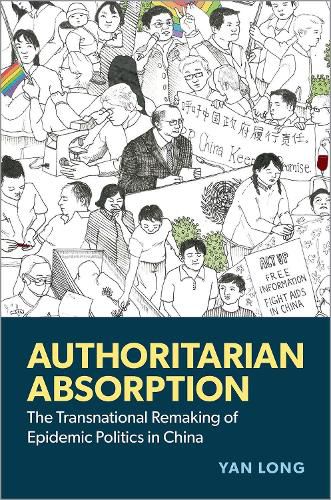Readings Newsletter
Become a Readings Member to make your shopping experience even easier.
Sign in or sign up for free!
You’re not far away from qualifying for FREE standard shipping within Australia
You’ve qualified for FREE standard shipping within Australia
The cart is loading…






Authoritarian Absorption portrays the rebuilding of China's pandemic response system through its anti-HIV/AIDS battle from 1978 to 2018. Going beyond the conventional domestic focus, Yan Long analyzes the influence of foreign interventions which challenged the post-socialist state's inexperience with infectious diseases and pushed it towards professionalizing public health bureaucrats and embracing more liberal, globally aligned technocratic measures. This transformation involved a mix of confrontation and collaboration among transnational organizations, the Chinese government, and grassroots movements, which turned epidemics into a battleground for enhancing the state's domestic control and international status. Foreign interveners effectively mobilized China's AIDS movement and oriented activists towards knowledge-focused epistemic activities to propel the insertion of Western rules, knowledge, and practices into the socialist systems. Yet, Chinese bureaucrats played this game to their advantage by absorbing some AIDS activist subgroupsDLnotably those of urban HIV-negative gay menDLalong with their foreign-trained expertise and technical proficiency into the state apparatus. This move allowed them to expand bodily surveillance while projecting a liberal facade for the international audience. Drawing on longitudinal-ethnographic research, Long argues against a binary view of Western liberal interventions as either success or failure, highlighting instead the paradoxical outcomes of such efforts. On one hand, they can bolster public health institutions in an authoritarian context, a development pivotal to China's subsequent handling of COVID-19 and instrumental in advancing the rights of specific groups, such as urban gay men. On the other hand, these interventions may reinforce authoritarian control and further marginalize certain populationsDLsuch as rural people living with HIV/AIDS and female sex workersDLwithin public health systems.
$9.00 standard shipping within Australia
FREE standard shipping within Australia for orders over $100.00
Express & International shipping calculated at checkout
Authoritarian Absorption portrays the rebuilding of China's pandemic response system through its anti-HIV/AIDS battle from 1978 to 2018. Going beyond the conventional domestic focus, Yan Long analyzes the influence of foreign interventions which challenged the post-socialist state's inexperience with infectious diseases and pushed it towards professionalizing public health bureaucrats and embracing more liberal, globally aligned technocratic measures. This transformation involved a mix of confrontation and collaboration among transnational organizations, the Chinese government, and grassroots movements, which turned epidemics into a battleground for enhancing the state's domestic control and international status. Foreign interveners effectively mobilized China's AIDS movement and oriented activists towards knowledge-focused epistemic activities to propel the insertion of Western rules, knowledge, and practices into the socialist systems. Yet, Chinese bureaucrats played this game to their advantage by absorbing some AIDS activist subgroupsDLnotably those of urban HIV-negative gay menDLalong with their foreign-trained expertise and technical proficiency into the state apparatus. This move allowed them to expand bodily surveillance while projecting a liberal facade for the international audience. Drawing on longitudinal-ethnographic research, Long argues against a binary view of Western liberal interventions as either success or failure, highlighting instead the paradoxical outcomes of such efforts. On one hand, they can bolster public health institutions in an authoritarian context, a development pivotal to China's subsequent handling of COVID-19 and instrumental in advancing the rights of specific groups, such as urban gay men. On the other hand, these interventions may reinforce authoritarian control and further marginalize certain populationsDLsuch as rural people living with HIV/AIDS and female sex workersDLwithin public health systems.